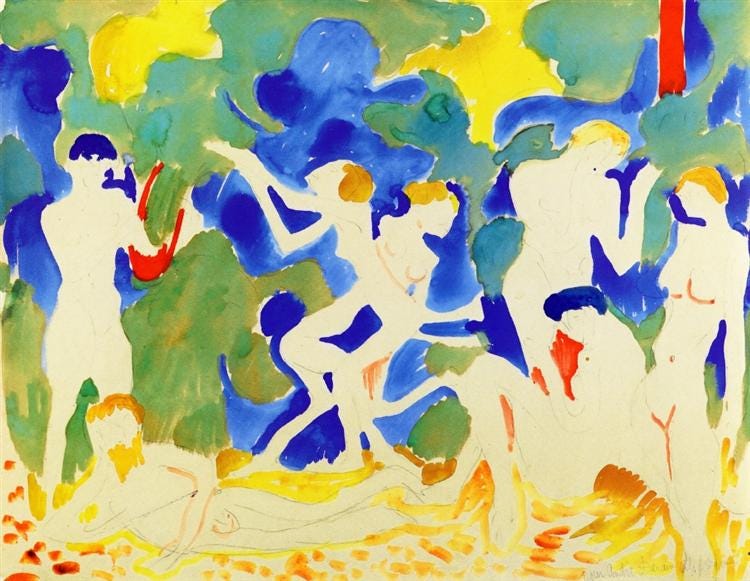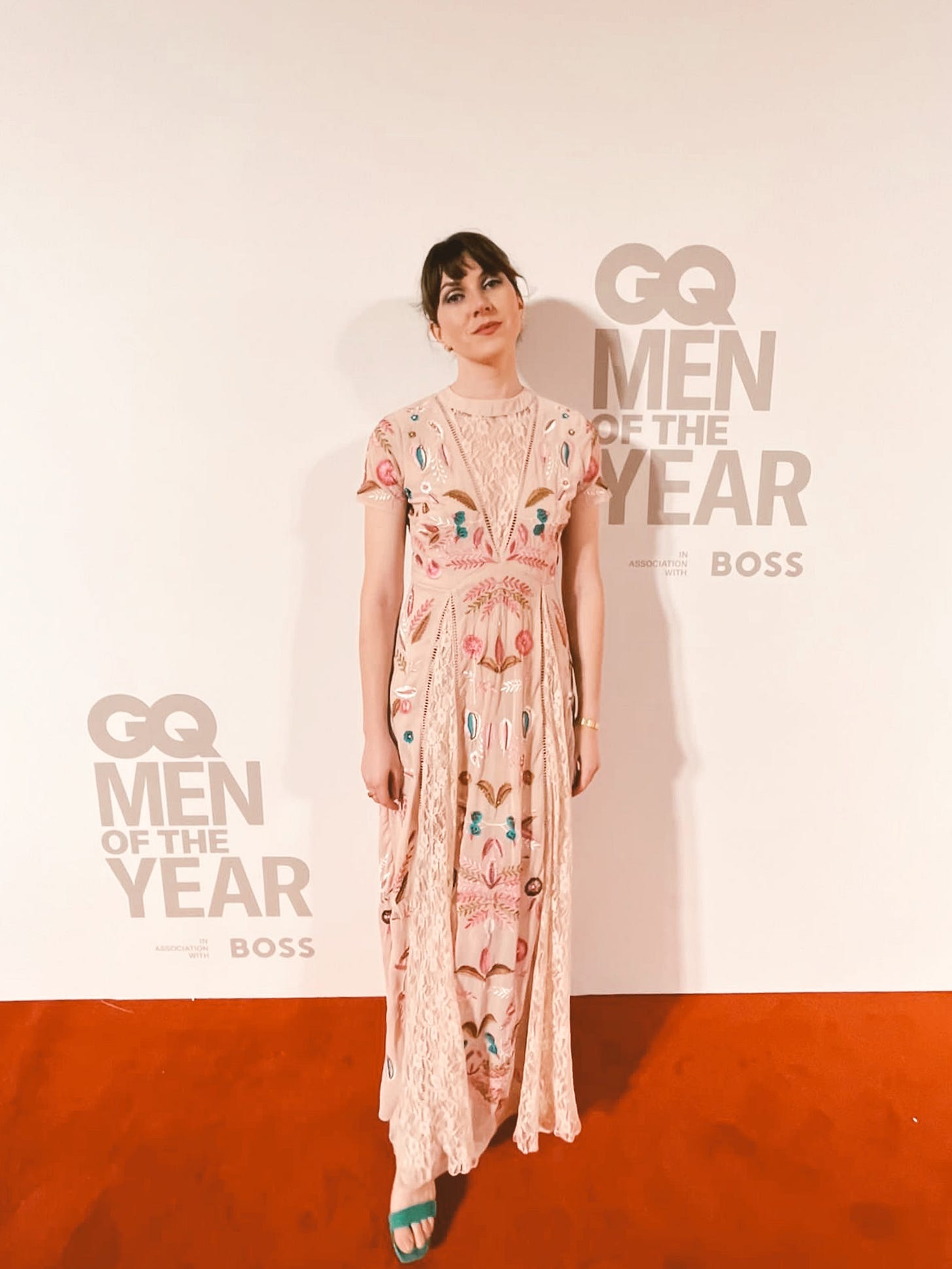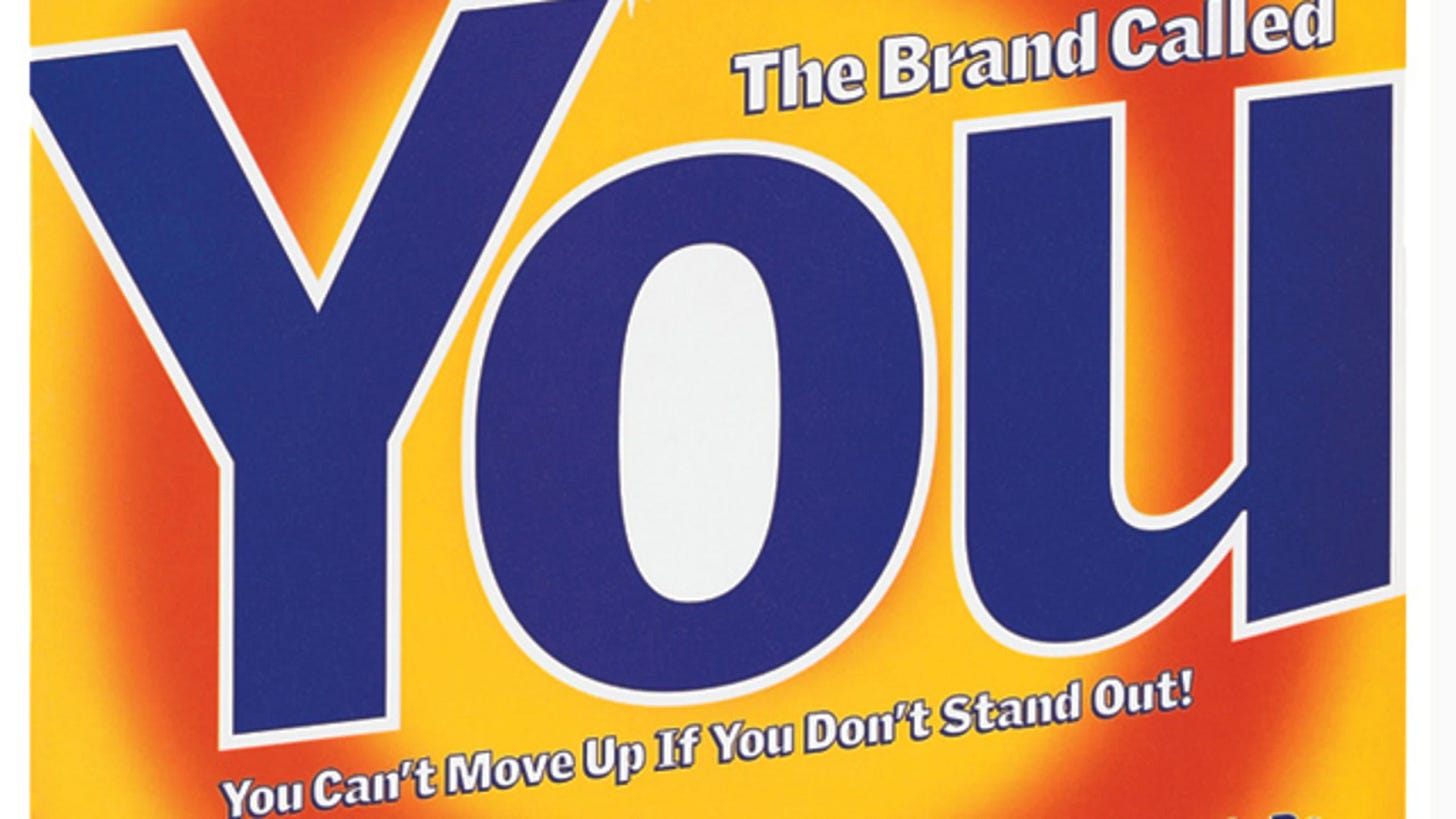Fake it till you make it
On performing the Self.
‘What aren’t we building when we’re building our brands?’
Naomi Klein
i.
Recently, I had the garish good fortune to attend British GQ’s Man of the Year.* With thirty minutes to prep, I assessed my wardrobe and reviewed my jewelry, identifying the pieces with which I would perform the reality that I, too, was a celebrity and I, too, belonged. (Note-to-self, when your gut tells you to go for the suit, go for the suit).
While the Netflix frontrunners, pop stars, and ex-boyfriends of pop stars signed autographs, I stood in line with the D-list celebrities, YouTube stars, and TikTok influencers. I tried to look bored, rather than enthralled, as though this was a constant feature of my life. I twirled a thin diamond band - handed down to me by my mom - on my pinky finger, a safety blanket or signal of sorts that I nearly consistently wear when I’m attending an event where I’m not sure I belong.
B. and I considered our costumes for the evening: what characters would we put on tonight? B. is a journalist and I am a hobbyist singer-songwriter, so we decided to settle on the deliciously vague ‘writer’ and ‘musician.’ Turns out, when you go to a party for up-and-coming celebrities, no one really asks you too many questions, and so our personas remained intact for the evening.
The night allowed me an opportunity to play with self-making, at creating a deliberate image of myself to project to strangers (still would’ve been better if I’d worn the suit). Of course, this is something we all do a lot of the time, but this was the Cinderella expression: I had one night to become whatever I wanted, and no one would be the wiser (until they started asking for my Instagram, of course).
The past year or so, I’ve been considering the art of the brand, about what it means to be the CEO of Me, Inc., in part because a having a brand strategy seemed to be an integral part of releasing an album. I admit, with some chagrin, that I am enthralled by the power that comes when a person successfully cultivates, projects, and executes their brand. But I am also deeply skeptical - I value authenticity, and I struggle to find the line between authentic self-expression as compared to self-creation molded to fit the image of the times.
ii.
Branding likely originated thousands of years ago when ancient craftspeople put identifying marks on their products to differentiate them in the marketplace. Later, guilds in the Middle Ages required artisans to brand their wares, helping build notoriety for each guild. Over the next several centuries, branding evolved into a key component of consumer products and marketing strategies. With the advent of the internet, personal branding was democratized as individuals could craft their own brands. As Tom Peters wrote in 1997, "To be in business today, our most important job is to be head marketer for the brand called You." A decade later, social media platforms like Twitter and Instagram accelerated the convergence of personal identity and branding.
Branding is inherently linked to desire. Effective branding associates positive attributes to a product or name, making it more desirable. An example: Apple branded itself as innovative, cool, and artistic - catnip for creatives. I switched to Apple just before college because the laptops seemed sleeker and prettier than my clunky Dell. Now I reinforce that choice by using Logic music production software, which is exclusive to Apple. Through strategic branding, Apple convinced me their products would align with my identity and desires as a creative person. TL;DR: if I use their products, I will become the creative I desire to be.
Extending that from a product to a person, we now live in an era where almost anyone has the ability to sell the idea of themselves. We see the proliferation of influencers peddling ‘courses,’ which are essentially guides that promise their life to their followers. The Kardashians demonstrated the power of lifestyle branding through social media. As Tara Isabella Burton writes, “[Kim’s] public persona is a celebration of the potential of living as an advertisement. What Kardashian sells to the public is the fantasy of selling yourself.” Kim herself underscored this idea: “If I’m doing it, then it’s attainable.”
iii.
I’m a multi-passionate person (aren’t we all?), and I’ve spent much of my life trying to choose between passions to avoid “spreading myself too thin” (in the words of my college counselor) and “half-assing a bunch of things rather than whole-assing one thing” (in the words of Ron Swanson). I chose between being a skier and being a figure-skater (skier), between being a professional skier and a normal high school student (student - I figured the intelligence would outlast the knees). I realize, though, that these things aren’t just activities, they can also be identities.
I’ve tried to accept my many passions (including the ones I have yet to discover) and the fact that this may mean I half-ass a lot of stuff rather than whole-assing one thing. If I’m lucky, maybe I’ll even get to whole-ass a lot of things. The trouble with that, though, lies in conveying the fullness of one’s self in a coherent brand in a world of content overload and fraying attention spans.
A few months ago I learned about the Google Knowledge Panel, the quasi-equivalent of the blue checkmark of the Twitter of old. This was in the context of Email Guy explaining that, in order to be seen more credibly as a “Musician,” I should pursue blog placements and news articles in order to get the backlinks required to obtain the mythical Knowledge Panel.
On the one hand, I crave the Knowledge Panel. I suffer the dreaded imposter syndrome when it comes to my music and I feel that having one would alleviate this (it probably wouldn’t). On the other hand, though, I worry that having a Knowledge Panel for music would necessarily confuse professional networks and muddy the waters of my climate-related career. Indeed, I launched this SubStack a year ago and failed to write for many reasons, one of them being the fear of confusing people. Would I be taken for a credible intellectual if I also write about my *gasp* feelings and interpretations of the world as I live it? I mean, what is it she actually does?
More than that, though, I wonder if it’s possible to actually separate the self from the performance of self. I am a reluctant chameleon. I recognize the numerous times I have taken on the identities I assumed are required of me by my environments and my activities; I preempt them, and I am often disappointed when I do not live them thoroughly enough.
iv.
We are acculturated to believe that each of us has the ability to become whoever we want to be, that it is a moral requirement to become ourselves. But how can we understand ourselves and our desires when our desires are so often shaped by others? How does one create a brand born out of this confusion?
Sometimes, I think about Taylor Swift and I am ashamed. That woman just loves to work, to curate her brand, and she is fucking good at it. If she can do it, I think, then why not me? But what would I do? Should I be diving deeply into the cycle of music content creation, hoping to go viral on social media? Should I switch my writing to narrowly focus on the climate crisis and chuck my music stuff into the dead dreams bucket? Should I try to harness that ambiguous adjective ‘quirky’ to become the non-threatening but somehow beguiling everygirl on the internet? Aren’t we saturated with all of those brands already?
And it is this ever-growing list, I think, that proves to me I just don’t have the stamina to create that coherent brand. How exhausting to be constantly cultivating it. How exhausting to have to “date” Tom Hiddleston for the brand. How exhausting to have to reshape your brand when the public decides it’s time. How does one perform the self and keep the self?
As I write more regularly, I realize that I rarely have a tidy conclusion. I write to better understand and lay bare the dissonance I feel. I would love to have the power of a clear personal brand, but god it just seems like a lot of work. Then again, my writing here can also be construed as a brand exercise. I suppose, if anything, my brand is fuck it. Do the thing (or be the thing?) and see what happens. And maybe, if you start getting enough traction, hire a publicist.
Self-Made: Creating Our Identities from Da Vinci to the Kardashians by Tara Isabella Burton (book or Gray Area podcast).
Angie McMahon’s Light, Dark, Light Again.







loved the last part about how this is all just meant to lay bare the dissonance. its expected to sway between the conundrums and what ifs and could be's. I think, what could be started is just a healthy habit of doing 20min daily of your brand "fuck it". Like your substack writings, like Taylor's work, everything is only built via muscle memory and not active pursuit. You have dreams Antje, and your definition of failure is what others would define as success. It's good to be greedy and ambitious and I hope you take comfort in knowing, you're doing good and will do better.